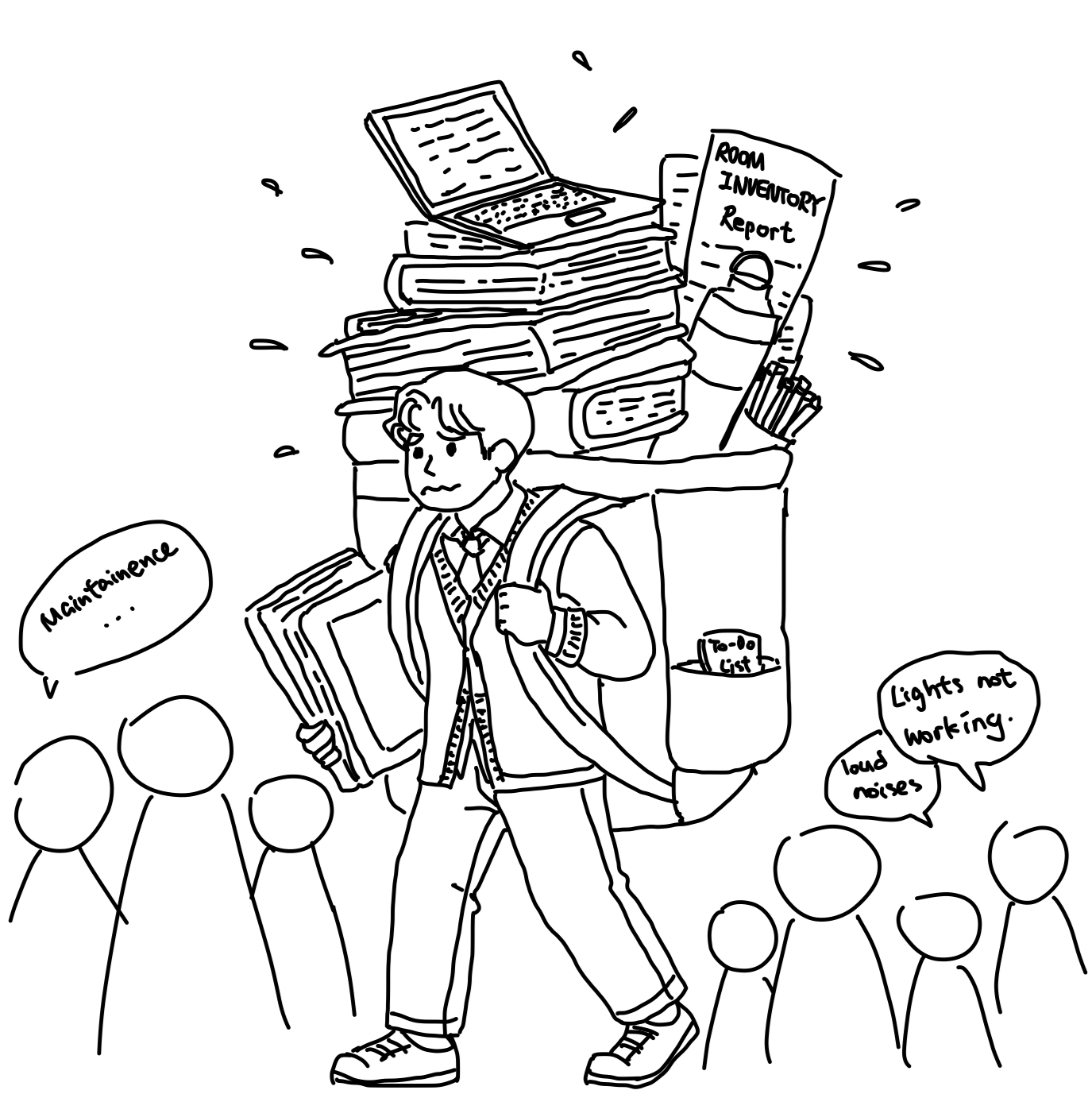When community advisors (CAs) arrived on campus in August for their annual training, they were met with changes to their roles — leaving student leaders at odds with the administration over how the new responsibilities were communicated.
Marina Ananias `26, a returning CA for Rathje Hall, said that when she signed her contract last semester she didn’t know how much she would get paid or the significant changes her role would undergo. Some CAs said their job responsibilities have seen sudden changes and additions, including changed responsibilities regarding hall decorating and organizing weekly events for residents.
This is not the first time CA job descriptions have changed, but for some, it came as a shock.
“None of that was said when we were reapplying,” Ananias said, referring to the changes in her job description. “It came almost as a surprise once we got here.”
Mattia Wells, director of strategic communications and media relations, wrote in an email to The S&B that “CAs were informed of the CA Work Rules before accepting their roles and received a copy at that time. The expectations outlined in the work rules have not changed, but Residence Life has provided additional clarity regarding approved programming and tools needed to meet expectations.” Wells also wrote that Residence Life is open to input from CAs.
For some new CAs, like Kayeon Yoo `27, these expectations did not align with their initial perceptions of the job. Yoo, a CA for Dibble Hall, accepted the position motivated by the privacy of a single room and assumed the role would be simple, influenced by what she had heard from previous CAs who managed the job while juggling other campus positions.
Yoo noted federal law prohibits international students from working more than 20 hours a week while classes are in session, but she sometimes finds herself overworked because of the CA duties.
“I like working as a CA. I get to interact with a lot of people, and, you know, I’ve met a lot of friends,” Yoo said.
Niko Vamvakides `27, a CA in Main Hall, said he wasn’t satisfied with a new responsibility requiring CAs to track how many interactions they have with residents each week. “I just wish that we could kind of do certain things a bit more naturally. A lot of what we do feels slightly forced.”
“I feel [tracking resident interactions] makes everything kind of artificial,” said Laura Alvarez `27, a CA in Cleveland Hall.
Alvarez also voiced concerns about balancing multiple jobs. “I have another job on campus. I work at Burling, and I need to do that because I need money,” Alvarez said. “Although we [community advisors] are doing so much, I don’t think we get paid enough for the job they want us to do.”
CAs are divided into clusters — subgroups of halls divided by North, East and South Campuses. “I know that depending on the cluster you are, the expectations are different, which, for me, it’s very problematic because we are all receiving the same amount of money,” said Ananias.
CAs take turns doing on-call shifts, which entail being available for students to call them for 24 hours and doing two rounds to check all floors of dorms of their designated group. The frequency of on-call shifts depends on which cluster they are a part of. Starting this semester, community advisors have different agreements on the amount of work during this period.
Beatriz Polo Diz `27, CA in Norris Hall said, “We have a round that starts at 8 p.m. and then another round that starts at 11 p.m. So between 8 p.m. and 11 p.m., we should stay in the lounge.”
“I don’t believe we’ve started doing that, but that is something that was proposed,” Vamvakides, who is in the South cluster, said in reference to staying in lounges while on-call.
While some community advisors on South Campus reported working as few as five hours, most on North Campus said they were reaching 16 hours. On East Campus, Ananias said the workload “really depends on the week, and it has definitely been double or triple the time there would be last year.”
Vamvakides said he thought these changes were likely implemented “because there wasn’t enough interaction between CAs and residents.”
“From what I’ve listened to, the reason for all of the extra work is coming from that place of ‘oh, after the agreement with the union, now CAs need to work 16 hours’,” said Ananias. Last semester, the Union of Grinnell Student Dining Workers (UGSDW) ratified a historic contract that now allows community advisors to choose to be compensated hourly instead of receiving a room grant.
Conrad Dahm `26, co-president of Union of Grinnell Student Dining Workers (UGSDW), said these changes were not mandated by the union contract. “These changes are solely because of the College. Specifically, the College actually has the right to do this,” Dahm said.
Dahm referenced section 3.3 of the Collective Bargaining Agreement between the College and UGSDW, which says “… the College (a) maintains the absolute right to carry out the educational mission of the institution, and (b) shall be the sole judge of all matters pertaining to student employment including the location and scheduling of such employment.”
“Residence Life itself, and particularly the role of the RLC [Residence Life Coordinator], it’s constantly changing,” said Hannah Sweet `25, UGSDW co-president, who previously worked for two years as a CA. “There’s only one returning RLC, and so what Residence Life looks like at the College fluctuates so much because of that.”
Editor’s Note: This article has been revised to include the correct link to the Collective Bargaining Agreement between the College and UGSDW.







